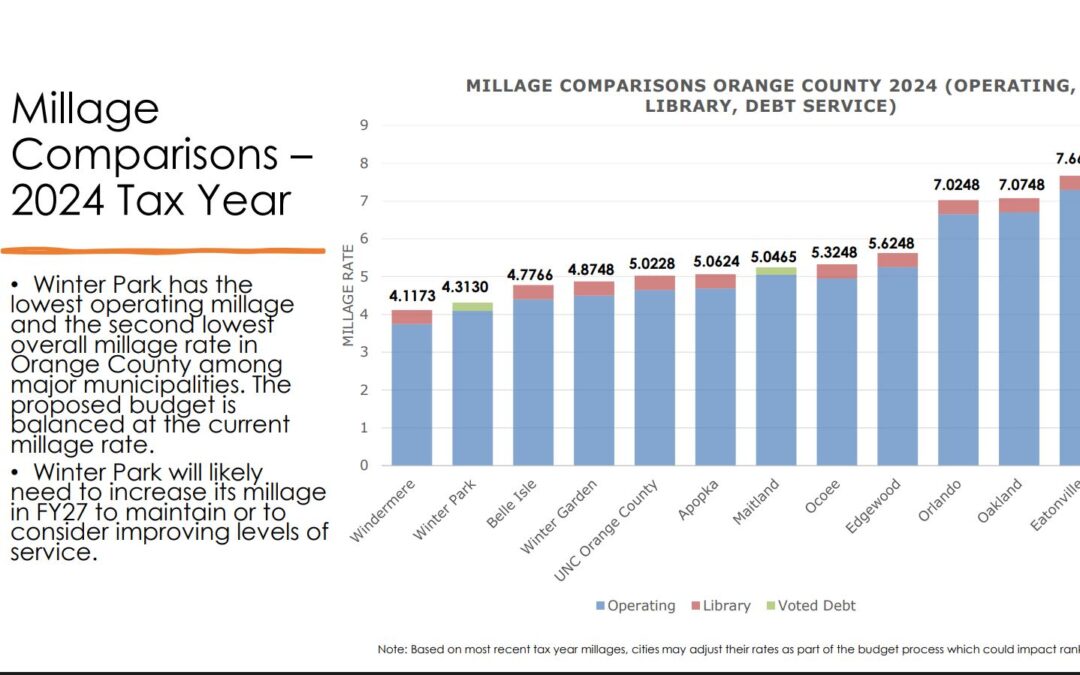
by Beth Kassab | Aug 5, 2025 | City Commission, News, Taxes, Uncategorized
Winter Park to keep property tax rate the same for 18th year
The city’s $233.5 million budget accounts for 7% growth in property tax revenue based on higher values as well as increases in utility fees
Aug. 5, 2025
By Beth Kassab
Winter Park City Commissioners will keep property tax rates the same for the 18th year in a row despite pressure from two commissioners to consider increases.
With a 3-2 vote to hold the line at the July 23 City Commission meeting, officials signaled that the increase in property values will drive a 7% increase in property tax revenues — from $36.2 million to $38.9 million — will be enough to cover expenses along with significant proposed increases in utility rates.
The city’s overall budget is proposed to increase by 8.9% or $19 million to $233.5 million.
City Manager Randy Knight cautioned that its likely he will ask commissioners to raise the property tax rate next year on top of the utility increases that are being proposed this year.
Mayor Sheila DeCiccio along with commissioners Warren Lindsey and Kris Cruzada voted to keep the millage rate the same. Commissioners Marty Sullivan and Craig Russell dissented.
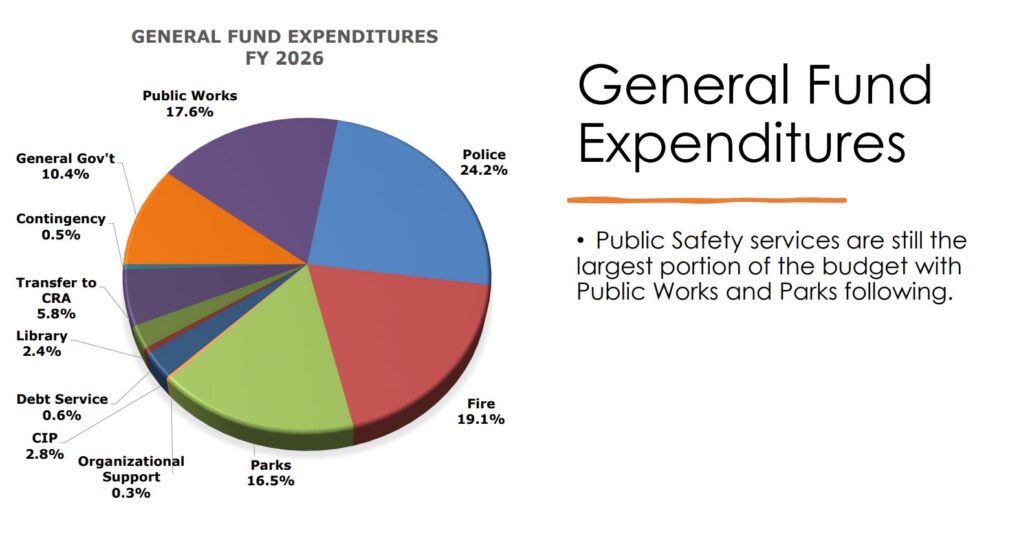
Sullivan began talking about a potential increase months ago in a letter to residents, citing growing costs and changing economic conditions. He said he wanted to raise the millage rate by a quarter mil with the intent of revising it back down in September after receiving reassurance from the city’s share of revenue from the state sales tax and other sources wouldn’t plummet.
“That’s a big unknown,” he told the group, citing needs like a new fire training center and continuing to build the city’s reserve fund, which would prove crucial in the event of a major hurricane or other disaster.
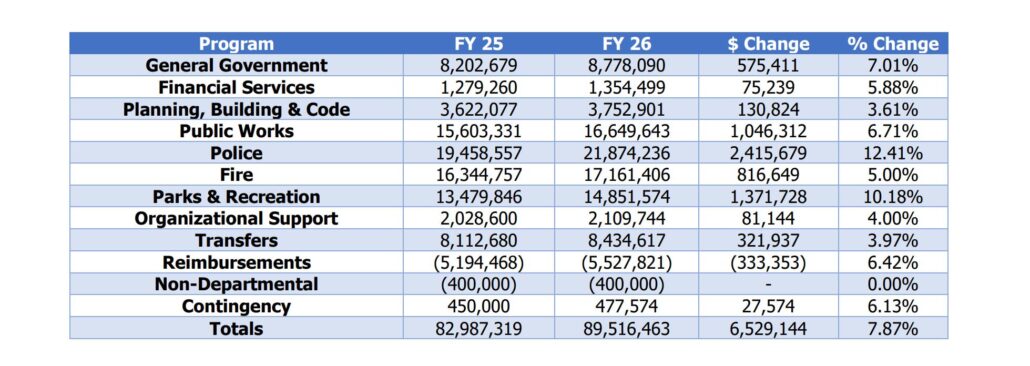
Russell surprised some observers by going even further, proposing a half mil increase.
He was elected as a first-time candidate in 2024 and was championed by local business interests and even campaigned on cutting taxes and targeting waste.
But he said he’s learned a lot about what it takes to keep the city running with the high level of service that residents have come to expect.
“How long can we provide the level of service we do without addressing that taboo subject?” he asked.
He proposed earmarking any increase for specific needs like roads or sidewalks to provide residents with “transparency” about how the dollars will be spent.
Russell said he knows most elected officials shy away from raising taxes because it could cost them their jobs the next time voters got to the polls.
“Anybody sitting up here is afraid of not getting elected the next time,” he said. “I’m a liar …” he said referring to his own campaign materials last year that called for reducing taxes. “But when you dive into it and sit here and you take on fiscal responsibility for thousands of people you have the ability to learn what that really means.”
The seats belonging to Sullivan and Russell are up for election next year.
DeCiccio expressed some doubt about how much longer the city would be able to maintain property tax rates, even with higher appraised values. She attributed the city’s growing values to the level of service residents receive when it comes to quick police and fire response, parks, roads, electricity and other services the city provides.
“The level of service and higher property values go hand in hand,” she said. “It truly amazes me that we are able to maintain the same millage rate and still maintain that … I don’t know how long we will be able to do it, but we can definitely do it this year, make this the 18th year we don’t raise property taxes.”

Residents will, however, see other proposed changes that are likely to hit their wallets.
The average resident will pay an extra $23 for electricity, water and stormwater is the proposed changes are approved.
The next budget hearing will take place next week on Aug. 13 where residents can sign up to speak on the budget.
WinterParkVoiceEditor@gmail.com
To comment or read comments from others, click here →
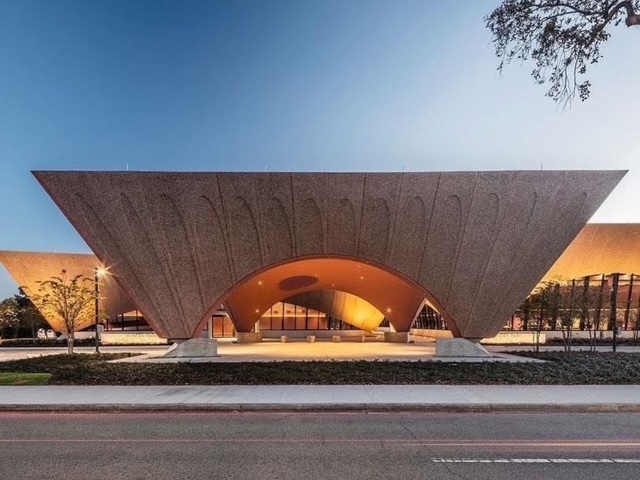
by Beth Kassab | Jul 11, 2025 | City Commission, Library, News, Uncategorized
Winter Park has a Long List of Complaints over Library and Events Center Construction
City officials and the contractor are meeting to try to resolve the problems
July 11, 2025
By Beth Kassab
Note: This story has been updated to include a statement from the contractor received on Saturday.
During the nearly four years since the more than $42 million Library and Events Center opened, Winter Park officials have compiled a list of what they say are construction concerns such as fracturing glass in some of the large panoramic windows, roof leaks, problems with the elevator and even the port-cochere, the grand covered entrance to the structure.
City Manager Randy Knight recently told the City Commission that the city is frequently meeting with representatives from contractor Brasfield & Gorrie to resolve the problems.
“Right now, we think they are going to resolve these issues,” Knight said. “But we’re going to go ahead and preserve our rights” before the statute of limitations runs out on filing a lawsuit over the claims.
This week the city notified the construction company and insurers of what it considers to be a “default” on the job to preserve the city’s right to sue if the problems aren’t fixed.
A spokeswoman for Brasfield & Gorrie, a national construction firm with offices in eight states that reported $6.4 billion in revenues last year, confirmed on Saturday that the firm is in talks with the city.
“We are discussing the city’s concerns and seeking resolution,” said a statement from the company.
Voters narrowly approved a bond referendum for $30 million in 2016 to pay for the project designed by British architect David Adjaye. Then, in 2020, the City Commission approved spending $41.7 million on the project. But, so far, the final tally is even higher at $42.3 million after the city added another $300,000 in 2022 from the American Rescue Plan Act, the federal stimulus package spurred by the pandemic.
The letter to the contractor lists 12 items that “has not been performed per plans and specifications” from the doors, lighting, air-conditioning and even the bathroom faucets along with the doors, windows, roof leaks and other concerns.
City spokeswoman Clarissa Howard said on Friday the contractor is continuing to meet with the city and working to resolve the matter.
WinterParkVoiceEditor@gmail.com
To comment or read comments from others, click here →

by Beth Kassab | Jul 10, 2025 | City Commission, News, Uncategorized
City Says the Problem Causing Smelly Water is Now Resolved
But the odor caused after lightning struck a water treatment plant could linger a few more days. Plus, state budget wins for Winter Park projects
July 10, 2025
By Beth Kassab
Residents complaining of a strong sulfur smell coming from their faucets in recent weeks got some good news on Thursday: The damage likely caused by a lightning strike to the ozone generator at one of the city’s water treatment plants appears to be resolved though the odoriferous problem may continue for a few days.
City Hall posted the update on Thursday afternoon after complaints about the smell and lack of information about it surfaced publicly at the City Commission meeting on Wednesday.
A power surge during a lightning storm hit the water treatment plant, one of three that supplies water to residents, on June 27 and city staff has been working ever since to bring the machine that oxidizes the city’s water to help purify it and reduce the rotten egg smelling sulfur often associated with Florida groundwater.
The water is safe to drink and the output from the damaged plant was reduced and treated with additional chlorine while repairs were underway, City Manager Randy Knight said.
“Twelve days of sulfur smell is a lot,” Cathy Baumgardner, who lives just north of Howell Branch Road, told the commission on Wednesday. “That’s not the big issue. The big issue is the lack of communication. Nobody contacted us … we didn’t know it was healthy until we called and asked.”
David Zusi, director of Water and Wastewater Utilities, said the water plants had withstood lightning strikes before but never one so severe that a portion of the treatment system was offline for so long. He said a number of experts, including the manufacturer of the ozone generator, which removes hydrogen sulfide from the water, were called in to help resolve the problem.
“This issue was extremely difficult to diagnose because no fault code was generated within the system,” the official update read. “Please note it may take a few days for the water with elevated hydrogen sulfide to flow out of the distribution system before it returns to normal odorless water.”
City to get $800k in project dollars from state
At at time when local governments are scrapping for every dollar from Tallahassee, Winter Park officials said this week that three projects requests made it into Gov. DeSantis’ final budget, escaping the veto pen.
DeSantis signed the $117.4 billion budget last week after cutting $567 million in line-item vetos.
- The largest score is $500,000 to replace the bridge on Stirling Avenue over Howell Creek. The 70-year-old bridge will be replaced, including drainage for surface water, sidewalks and railings over the bridge.
- The city will also receive $250,000 to dredge Lake Lillian at Mead Gardens.
- And $62,500 will go toward bollards or sturdy posts that act as a barrier between pedestrians at events and vehicles.
WinterParkVoiceEditor@gmail.com
To comment or read comments from others, click here →
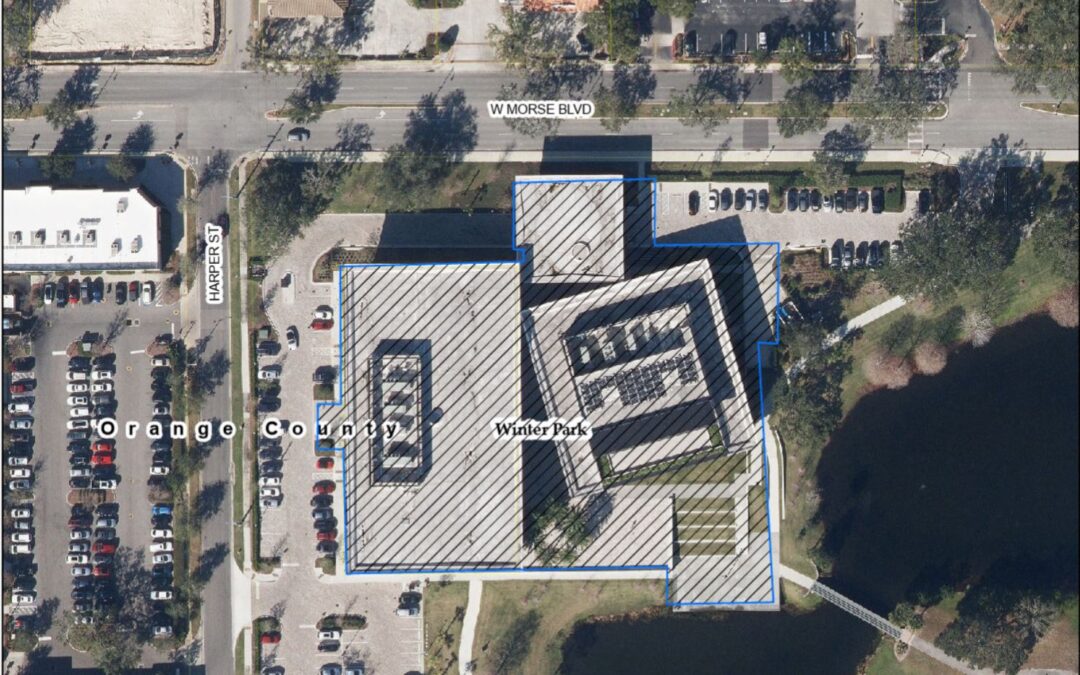
by Beth Kassab | Jul 10, 2025 | City Commission, Library, News, Uncategorized
Winter Park Approves Limits on Protests and Activity at Library and Events Center
In a split vote, the City Commission approved a new ordinance that they claim is based on complaints over photo shoots and one small protest at the public buildings
July 10, 2025
By Beth Kassab
The Winter Park City Commission on Wednesday voted 3-2 to approve an ordnance that draws a boundary around the Library and Events Center as essentially a new “no protest” or gathering zone.
Mayor Sheila DeCiccio and commissioners Craig Russell and Kris Cruzada voted in favor of the ordinance. Commissioners Warren Lindsey and Marty Sullivan voiced strong objections to the change and voted against it.
DeCiccio and city staff say the ordinance is needed to protect groups and individuals who rent space in the buildings for weddings, corporate meetings and other events from disruptions from people who may want to stage protests or use the $41 million complex’s unique architecture as a backdrop for extensive photo shoots or other gatherings.
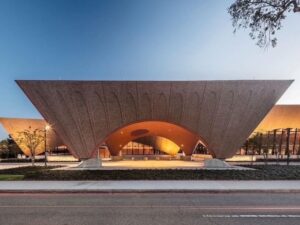
The Winter Park Events Center opened in late 2021 and was designed by British architect David Adjaye.
The new “no protest” area — the blue line drawn around the complex in the image above — mostly hugs the outline of the buildings, but also includes a large amount of outdoor space on the southeast corner of the building, which has large windows looking out onto Martin Luther King Jr. Park.
Lindsey, a criminal defense attorney, noted the irony of the city imposing what he views as First Amendment restrictions on the same week Winter Park plans to dedicate its commissioned larger-than-life bronze statue of King at an installation in the park known as Unity Corner.
“I think it’s interesting that this coming up Saturday we are going to be dedicating the statue … probably within 200 or 300 yards of the restricted areas,” he said, noting that the monument includes the words “courage is the power of the mind to overcome fear.” “I think a lot of times there a temptation that because we’re fearful of something we will overreact and Martin Luther King Jr. provided us instruction on that.”
He called the ordinance an “unnecessary use of government power.”
“We should be very, very careful how we use our power, especially how we use our police power,” he said. “And the only real argument for passing this thing is to deal with a hypothetical problem that has not occurred … that is something we should be very careful about doing.”
A list of 15 “disturbances” since the beginning of this year provided by the city is not enough justification for the ordinance, Lindsey and Sullivan argued. Of those, 10 are described as “photo shoot with props” or “prom photos.” One noted a “changing booth” and “lights.”
The other disturbances were listed as “cars blocking traffic” or “skateboarding/rollerblading/scooter.” Only one was listed as “group with signs” or anything resembling a demonstration or a protest.
A police dispatch call log noted someone called police just after 6 p.m. on May 15 to report “6-7 people outside on the south side near the lake, holding up signs protesting.”
About the same time the police arrived, the caller called back to report “her boss says they are allowed to be there.”
At the time, the events center was being rented by the Orlando Lawyers Chapter of the Federalist Society for an event featuring Josh Blackman, who was recently appointed by President Donald Trump to the Religious Liberty Commission’s advisory board of legal experts. Blackman is a constitutional law professor at South Texas College of Law Houston.
Winter Park attorney Michael Sasso is the president of the Orlando chapter.
Sullivan said people should be required to pull permits for elaborate photo shoots and that there are laws on the books already to address cars blocking traffic or disorderly conduct. But the kind of demonstration that occured on May 15 should not be limited.
“I have it from a reliable source there were four people at 5:30 in the afternoon standing there with small signs,” he said. “To me, that should be an allowable public gathering and that in my mind illustrates how this [ordinance] goes beyond what is needed … this prohibits activities that in my mind are permitted First Amendment activities.
City Attorney Daniel Langley argued that the city is allowed to put more restrictions on the library and events center because it’s not “traditional public forum” because it’s rented out and used by other entities.
He said that perimeter is drawn tightly around the buildings and, in many cases, “they could move two feet into the parking lot and continue that activity.”
The ordinance calls for a warning to be issued before people are trespassed from the area and potentially given a fine.
Commissioner Craig Russell said he is in favor of the ordinance because it’s about safety and protecting the space for those renting the venue.
“… We’re also not trying to recreate Tiananmen Square either as a city, so I think this is a very reasonable measure,” he said, referring to the 1989 crackdown on protests by the Chinese government. “Out of all the green spaces we have in the city, why there? It’s a unique space and we have the responsibility to protect it … I truly believe it’s not about stifling rights or anything of that nature.”
DeCiccio, also an attorney, cited a U.S. Supreme Court case over a municipal bandshell that she said allows the city to put restrictions in place.
She said the ordinances “does not silence voices,” but sets aside a “relatively small area” to be protected from potential disruptions.
WinterParkVoiceEditor@gmail.com
To comment or read comments from others, click here →

by Beth Kassab | Jun 17, 2025 | Arts and Culture, Events, News, Uncategorized
Winter Park awaiting decision on Parade of Bands
The annual December tradition was cancelled last year and may not happen again because of the new college football playoff schedule
June 17, 2025
By Gabrielle Russon
Officials are currently deciding the fate of the annual Parade of Bands in Winter Park.
A decision is expected to be reached next month whether the December parade is a go or if it is canceled for the second straight year in a row.
The parade normally features the two university bands playing in Orlando’s Pop-Tarts Bowl.
“Florida Citrus Sports is the entity that determines whether or not they will have an event. Once we hear from them, then the city works with FCS for the Parade of Bands event coordination and logistics,” Winter Park spokeswoman Clarissa Howard said. “They are in discussions right now and will determine if there is a Parade of Bands at the end of July. At this point, we don’t have a confirmation yet”
The recently released bowl schedule shows the Pop Tarts Bowl begins at 3:30 p.m. on Dec. 27 at Camping World Stadium.
It is the same kickoff time as last year that forced officials to scratch the parade because of the logistical challenge of transporting hundreds of band members into Winter Park and feeding them before the game and the bands’ other responsibilities.
Blame the new expanded college playoff system for the earlier kickoff times.
City and FCS officials told the Winter Park Voice last year they were disappointed the parade wasn’t happening in 2024 but would try again in 2025 although they warned they couldn’t make any guarantees.
The parade shuts down Park Avenue as crowds line the street to hear the music and watch the mascots and cheerleaders go by. Then the masses gather in Central Park for a drum-off. The event, which is free, draws all ages and has been a tradition since 2007 in Winter Park.
“It has been a crowd-pleaser every year,” Johnny Miller, Winter Park’s special events manager, said at the time.
The marching bands are scheduled to make pregame cameos this year for tailgating at Tinker Field and a pep rally at Pointe Orlando. However, if there’s no parade, that means Winter Park residents miss out on the convenience and the magic of having the festivities right in the heart of their quaint downtown.
WinterParkVoiceEditor@gmail.com
Gabrielle Russon is a freelance reporter and former reporter for the Orlando Sentinel, where she covered K-12 education, colleges and universities and the tourism industry. She lives in Orlando with her family and writes about politics, education, theme parks and the courts.
To comment or read comments from others, click here →

by Beth Kassab | May 29, 2025 | City Commission, News, Uncategorized
Beef over Today Show visit, no more flouride and what to do over private pickleball noise
The City Commission also approved a new lease for the Benefit Shop at its most recent meeting
May 29, 2025
By Beth Kassab
Winter Park has had it up to the top of the Knowles Chapel steeple with giving away free publicity to the neighboring city of Orlando.
Earlier this month the Today Show filmed its third hour from Central Park as small crowd gathered to watch.
The city waived the park rental fee for Visit Orlando, the tourism marketing agency that coordinated the Today Show’s visit and that receives more than $100 million in taxpayer dollars intended to benefit the region.
Mayor Sheila DeCiccio said she was surprised that the show never thanked or even mentioned Winter Park on air. She said Visit Orlando representatives told the city the reason is because the show was an Orlando event intended to promote Orlando.
“I propose on a go forward basis that visit Orlando gets nothing from Winter Park for free unless credit is given to Winter Park or they can pay fees like anyone else renting the park,” DeCiccio said.
“They didn’t say at all they were in Winter Park?” asked Commissioner Craig Russell.
“Not one word,” DeCiccio responded.
“Oh, no you can’t … no …,” Russell said back.
“And they stayed at the Alfond Inn, too,” DeCiccio said, referring to the luxury hotel owned by Rollins College just off Park Avenue.
The segment featured an interview with Michael James Scott, the Broadway actor known for playing the Genie in Disney’s musical version of Aladdin who grew up in Central Florida and attended Dr. Phillips High School in Orlando, as well as chefs from three Orlando restaurants.
The Today Show snub comes on the heels of the New York Times’ “36 Hours in Orlando,” which recommended readers actually spend many of those hours in Winter Park and featured a large photo of Winter Park’s Scenic Boat Tour.
Fluoride to leave city water
City Manager Randy Knight told commissioners that the city would stop adding fluoride to its water system by July 1 in order to comply with a recently passed state ban.
He said it’s possible fluoride will be out of the water system before July because the city’s supply may run out before then and the utility did not order more because of the new state law.
At a Utilities Advisory Board meeting earlier this week, Water Utility Director David Zusi said the concentration of fluoride in Winter Park’s water was low and the additive does not affect the taste or water softness or hardness. As a result, residents won’t be able to detect the change, he said.
Alison Yurko, a member of the advisory board, said she wanted to make sure customers know that the change is a result of state law rather than local policy.
“I think this is going to have a very unfortunate effect on kids at the lower income level who don’t go to the dentist,” she said.
The American Dental Association and the American Academy of Pediatrics support using fluoride to help prevent cavities in children, especially in underserved communities. They also cite a lack of evidence for health harms when fluoride is at the current low levels used in most community water systems in the U.S.
The Florida Legislature and Gov. Ron DeSantis backed the state ban in the wake of renewed scrutiny over the additive driven by Robert F. Kennedy Jr., national secretary of Health and Human Services, who has called fluoride an “industrial waste,” citing its potential health risks.
Public health studies conclude that risks related to fluoride exposure are generally associated with receiving either too much or too little and do not apply to the low concentrations found in most public water systems.
Private pickleball? Commissioners worry over noise
There’s been a change of plans for a prominent corner near Park Avenue that may lead to new city regulations for private pickleball courts.
Last year a founder of Full Sail University sought approval to develop a three-story building at the corner of Morse Boulevard and Knowles Avenue to be anchored by Storyville Coffee, a concept he started on the west coast.
But Jon Phelps’ idea for the property has changed said City Planning & Zoning Director Allison McGillis. Plans now call for a one-story building that still includes a Storyville Coffee, but also a swimming pool and pickleball court to go along with the private residence portion of the building.
Commissioner Warren Lindsey raised concerns about potential noise from the courts so close to other businesses.
“I think we need to proactively address private pickleball courts,” he said.
McGillis said the city’s codes include regulations related to tennis courts, but not pickleball courts, and said noise complaints related to pickleball are common.
Commissioners asked her to come back to the group with recommendations for how to revise the city’s rules to address noise and any other concerns.
New lease for Benefit Shop
At the previous City Commission, members voted to pursue a 3-year lease with the Benefit Shop, a thrift store that once operated out of City Hall and raises money for local charities by re-selling household goods and clothes.
But on Wednesday the Commission voted 3-2 to change the term to five years with Commissioners Marty Sullivan, Kris Cruzada and Craig Russell in favor.
The shop, a longtime fixture in Winter Park, wanted a 35-year lease to move to the Lake Island Park building in MLK Park. But commissioners felt that was too long and limited future commissions who might need to consider additional uses for the building at some point.
Debbie Glaser, a co-manager of the shop, said it plans to re-open on Fridays and Saturdays from 9:30 a.m. to 2 p.m. at the new location beginning this week. She said the shop now has more than 20 volunteers and hopes to add additional hours in the future.
Information from Harvard’s Shorenstein Center on Media, Politics and Public Policy was used in this report related to the impacts of fluoride.
WinterParkVoiceEditor@gmail.com
To comment or read comments from others, click here →












Recent Comments